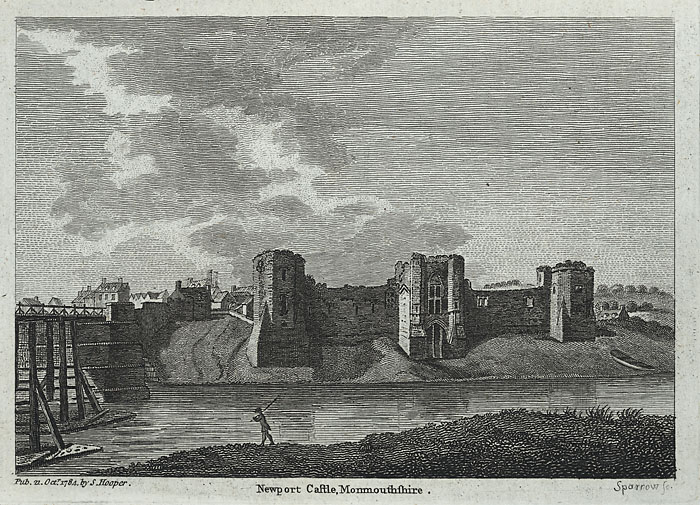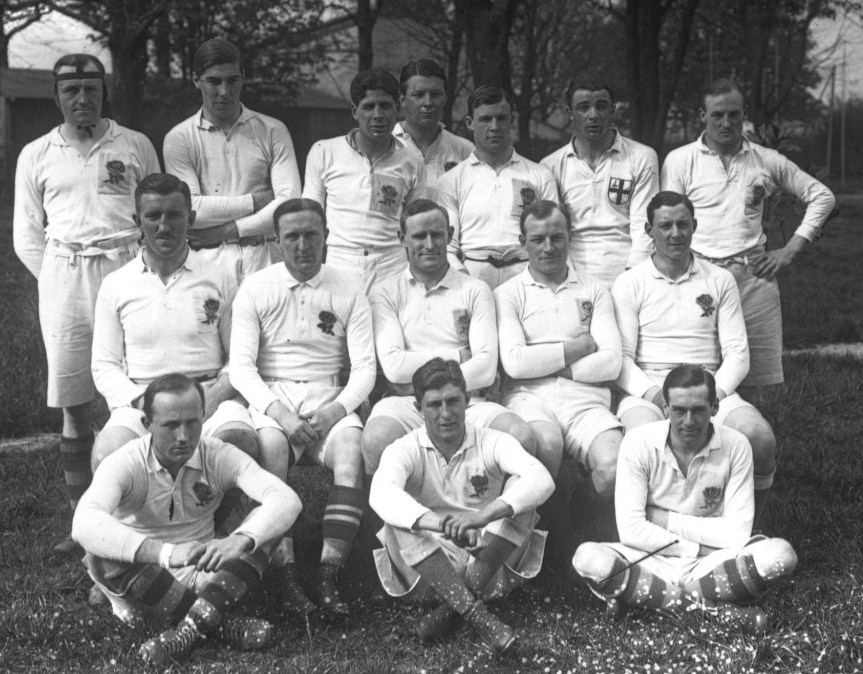|
Billy Geen
William Purdon Geen (14 March 1891 – 31 July 1915) was a rugby union wing and centre, who represented Wales, and played club rugby for Oxford University and Newport and county rugby for Monmouthshire. He was also invited to play for the Barbarians on several occasions. Geen unsuccessfully trialled for England in 1910, but was selected and played for Wales on three occasions in the 1912–1913 season. Injury prevented him from playing more internationals, and his service in the First World War put an end to his career. Geen excelled athletically at Oxford, earning four Blues between 1910 and 1913. However, in three successive Varsity Matches, he failed to score after dropping the ball over the tryline. In the holidays, he played club rugby for Newport, and he was part of the team that defeated the touring South African side of 1912–1913. He was also a decent cricketer keeping wicket for Oxford University Authentics and Monmouthshire. Geen was commissioned second lieutena ... [...More Info...] [...Related Items...] OR: [Wikipedia] [Google] [Baidu] |
Newport, Wales
Newport ( cy, Casnewydd; ) is a city and Local government in Wales#Principal areas, county borough in Wales, situated on the River Usk close to its confluence with the Severn Estuary, northeast of Cardiff. With a population of 145,700 at the 2011 census, Newport is the third-largest authority with City status in the United Kingdom, city status in Wales, and seventh List of Welsh principal areas, most populous overall. Newport became a unitary authority in 1996 and forms part of the Cardiff-Newport metropolitan area. Newport was the site of the last large-scale armed insurrection in Great Britain, the Newport Rising of 1839. Newport has been a port since medieval times when the first Newport Castle was built by the Normans. The town outgrew the earlier Roman Britain, Roman town of Caerleon, immediately upstream and now part of the borough. Newport gained its first Municipal charter, charter in 1314. It grew significantly in the 19th century when its port became the focus of Coa ... [...More Info...] [...Related Items...] OR: [Wikipedia] [Google] [Baidu] |
Wales National Rugby Union Team
The Wales national rugby union team ( cy, Tîm rygbi'r undeb cenedlaethol Cymru) represents Wales in men's international rugby union. Its governing body, the Welsh Rugby Union (WRU), was established in 1881, the same year that Wales played their first international against England. The team plays its home matches at the Millennium Stadium in Cardiff (currently known for sponsorship reasons as the Principality Stadium), which replaced Cardiff Arms Park as the national stadium of Wales in 1999. Wales has competed annually in the Six Nations Championship (previously the Home Nations Championship and Five Nations Championship) since it was established in 1883. They have won the tournament (and its predecessors) outright 28 times, most recently in 2021. Since 2005, Wales has been the most successful team in the Six Nations, winning six Six Nations titles. They include four Grand Slams, again more than any other side. Wales has also participated in every Rugby World Cup since the com ... [...More Info...] [...Related Items...] OR: [Wikipedia] [Google] [Baidu] |
Freddie Knott
Frederick Hammett Knott (30 October 1891 – 10 February 1972), known as Freddie Knott, was an English amateur cricketer. Knott played for Oxford University Cricket Club and Kent County Cricket Club in the years before the First World War. He played occasionally after the war, including once for Sussex in 1926. Knott was considered one of cricket's brightest schoolboy talents at Tonbridge School but had a more disappointing time at Oxford. He also played varsity rugby union and was a fine all-round sportsman, later becoming a scratch golfer. He served in the British Army in both World Wars and won the Military Cross after being wounded in Macedonia in 1917. Early life Knott was born in Tunbridge Wells, the eldest child of the Reverend Frederick George Knott and his wife Alice. His father was the first Headmaster at Skinners' School in the town. Knott attended Tonbridge School between 1905 and 1910 where he played cricket, captaining the school side in his final year, as well ... [...More Info...] [...Related Items...] OR: [Wikipedia] [Google] [Baidu] |
Dummy (football)
In association football, rugby league, rugby union and Australian rules football, a dummy or feint is a player deceiving the opposition into believing he is going to pass, shoot, move in a certain direction, or receive the ball and instead doing something different, thus gaining an advantage. Association football In association football, a dummy (feint) is often used when dribbling, in offensive situations. Examples used in order to deceive an opponent into what direction you will move, include: the '' step over'' as used by Ronaldo and Cristiano Ronaldo; the ''flip flap'' (also known as "elastico") used by Rivellino, Ronaldo and Ronaldinho; the '' Marseille turn'' (also known as the "360" or "roulette") used by Zinedine Zidane, and Diego Maradona; the '' rainbow flick'' as used by Neymar; the ''Cruyff turn'' named after Johan Cruyff; and ''scoop turn'' (dragging the ball around a defender without it leaving your foot) as used by Romário. The next most common instance is also an of ... [...More Info...] [...Related Items...] OR: [Wikipedia] [Google] [Baidu] |
Bryn Lewis
Major Brinley Lewis (4 January 1891 – 2 April 1917), known as Bryn Lewis, was a Welsh international rugby union wing who played club rugby for Newport and Cambridge University. He is one of twelve Welsh internationals to have died in active duty during World War I. Rugby career Lewis was born in Pontardawe, Wales but was educated at Swansea Grammar School and represented the Wales Schoolboy team. He later attended Cambridge University and while at university gained three 'Blues' when he was selected for three consecutive Varsity games from 1909 to 1911. Lewis gained his first cap for Wales against Ireland as part of the 1912 Five Nations Championship. The Welsh team was inexperienced and lost the game 12–5, not helped when Lewis's teammate Tom Williams broke his arm and continued playing in the second half of the game. Lewis was back the next year in the 1913 Championship, for his second and last cap, again against Ireland. Lewis scored two tries in the game which saw ... [...More Info...] [...Related Items...] OR: [Wikipedia] [Google] [Baidu] |
Try (rugby)
A try is a way of scoring points in rugby union and rugby league football. A try is scored by grounding the ball in the opposition's in-goal area (on or behind the goal line). Rugby union and league differ slightly in defining "grounding the ball" and the "in-goal" area. In rugby union a try is worth 5 points, in rugby league a try is worth 4 points. The term "try" comes from "try at goal", signifying that grounding the ball originally only gave the attacking team the opportunity to try to score with a kick at goal. A try is analogous to a touchdown in American and Canadian football, with the major difference being that a try requires the ball be simultaneously touching the ground and an attacking player, whereas a touchdown merely requires that the ball enter the end zone while in the possession of a player. In both codes of rugby, the term ''touch down'' formally refers only to grounding the ball by the defensive team in their in-goal. A Try is scored in wheelchair rugby fol ... [...More Info...] [...Related Items...] OR: [Wikipedia] [Google] [Baidu] |
Ronnie Poulton-Palmer
Ronald 'Ronnie' William Poulton (later sometimes Poulton-Palmer) (12 September 1889 – 5 May 1915) was an English rugby union footballer, who captained . He was killed in the First World War during the Second Battle of Ypres. Born in north Oxford, he was the son of Emily Palmer and her husband, the zoologist Sir Edward Bagnall Poulton. He was educated at the Dragon School, Rugby School, and Balliol College, Oxford. Poulton played for Balliol College, Oxford University RFC, Harlequins and Liverpool F.C. Poulton is one of three men to score a hat-trick of tries in The Varsity Match – he scored five, still the individual record for the fixture, in 1909. He captained England during the 1913–14 unbeaten season (now what would be called a 'Grand Slam'), scoring four tries against France in 1914, in the last test match prior to the outbreak of World War I. Poulton was renowned for his elusiveness and glamorous style of play – "the very mention of swerving sends one's thou ... [...More Info...] [...Related Items...] OR: [Wikipedia] [Google] [Baidu] |
Queen's Club
The Queen's Club is a private sporting club in West Kensington, London, England. The club hosts the annual Queen's Club Championships men's grass court lawn tennis tournament (currently known as the "cinch Championships" for sponsorship reasons). It has 28 outdoor courts and ten indoor. With two courts, it is also the national headquarters of real tennis, hosting the British Open every year excepting 2020 due to the coronavirus pandemic. The Queen's Club also has rackets and squash courts; it became the headquarters for both sports after the closure of the Prince's Club in 1940. History Founded as The Queen's Club Limited on 19 August 1886 by Evan Charteris, George Francis and Algernon Grosvener, the Queen's Club was the world's second multipurpose sports complex, after the Prince's Club, and became the world's only multipurpose sports complex when the Prince's Club relocated to Knightsbridge and lost its outdoor sports facilities. The club is named after Queen Victoria ... [...More Info...] [...Related Items...] OR: [Wikipedia] [Google] [Baidu] |
Blackheath Rugby Club
Blackheath Football Club is a rugby union club based in Well Hall, Eltham in south-east London. The club was founded in Blackheath in 1858, and is the fourth-oldest rugby club in continuous existence in the world, after Dublin University Football Club (1854), Liverpool St Helens F.C. (1857) and Edinburgh Academical Football Club (1857). The Blackheath club also assisted in organising the world's first rugby international (between England and Scotland in Edinburgh on 27 March 1871) and hosted the first international between England and Wales ten years later – the players meeting and getting changed at the Princess of Wales public house. Blackheath, along with Civil Service F.C., is one of the two clubs that can claim to be a founder member of both The Football Association and the Rugby Football Union. The club currently play in National League 2 East, the fourth tier of the English rugby union system, with matches played at Well Hall, after a move from Rectory Field in Black ... [...More Info...] [...Related Items...] OR: [Wikipedia] [Google] [Baidu] |
Wicketkeeper
The wicket-keeper in the sport of cricket is the player on the fielding side who stands behind the wicket or stumps being watchful of the batsman and ready to take a catch, stump the batsman out and run out a batsman when occasion arises. The wicket-keeper is the only member of the fielding side permitted to wear gloves and external leg guards. The role of the keeper is governed by Law 27 of the Laws of Cricket. Stance Initially, during the bowling of the ball the wicket-keeper crouches in a full squatting position but partly stands up as the ball is received. Australian wicket-keeper Sammy Carter (1878 to 1948) was the first to squat on his haunches rather than bend over from the waist (stooping). Purposes The keeper's major function is to stop deliveries that pass the batsman (in order to prevent runs being scored as 'byes'), but he can also attempt to dismiss the batsman in various ways: * The most common dismissal effected by the keeper is for him to '' catch'' a ... [...More Info...] [...Related Items...] OR: [Wikipedia] [Google] [Baidu] |







